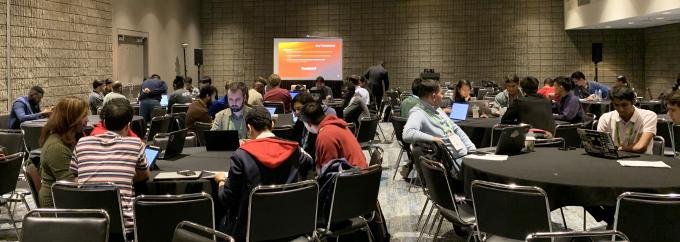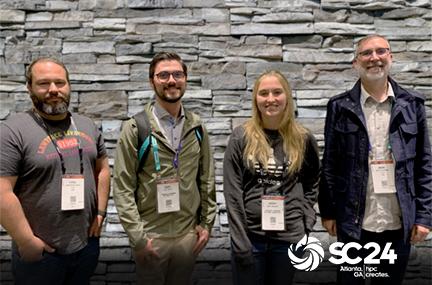Livermore’s decades-long leadership in high performance computing (HPC) takes many forms. From operating the world’s most powerful supercomputer to co-designing new hardware with industry partners, Laboratory staff strive to advance the field in order to deliver mission-critical HPC research and capabilities. This commitment is on display every year at the international Supercomputing Conference (SC), which brings together thousands of HPC experts, developers, users, vendors, and other stakeholders.
LLNL’s ubiquitous SC presence goes beyond attendance. Staff join conference committees, lead tutorials and workshops, present their work during technical sessions, and support the Department of Energy’s exhibit booth. “Participating in different ways at this premier conference allows our staff to keep abreast of the latest developments, network with colleagues around the world, and share the Lab’s many scientific contributions to the field,” states Computing’s principal deputy director Lori Diachin, who served as SC24 deputy conference chair and will preside as SC25 conference chair. For the many employees volunteering at the conference, serving the community is a key aspect of HPC leadership.
Student Guidance
The conference’s Students [at] SC program brims with advice and encouragement for undergraduates and graduates in HPC-related fields. As members of the SC24 organizing committee, Computing workforce administrator Jamie Lewis, Computing workforce manager Marisol Gamboa, and LLNL organizational development consultant Andrekka Lanier led several of these sessions, with Lanier delivering an interactive presentation on recognizing and combating imposter syndrome.
Conference attendance reached an all-time high of about 18,000, thanks in part to student participation. “I was surprised at the overwhelming response to our résumé workshop, one-on-one coaching sessions, and career panel, which maxed out the space,” says Lewis. “We worked hard to have representation from national labs, academia, and industry.” Career coaching demand exceeded its supply, so she enlisted several other HPC and scientific professionals to step in as last-minute mentors.
Although not every student ends up applying for a Livermore internship, Lewis asserts that outreach is still worthwhile. “Outreach does feed our workforce pipeline. In many cases, it’s a long pipeline, but people will always remember how you made them feel and how you helped them,” she points out. “Providing STEM exposure at any level is incredibly important, especially for those who may not normally have access to those resources.”
Diversity Advocacy
Computer scientist Elsa Gonsiorowski has helped organize SC’s Women in HPC Workshop since 2017, serving as co-chair for the past two years. The event fosters a welcoming environment for early career researchers and those from underrepresented groups, while helping participants value different career paths among a diverse workforce. In addition to mentoring, breakout activities, an invited speaker, and a reception, the SC24 workshop featured a “newbies” session—Gonsiorowski’s idea—to guide SC first-timers through the large conference and broaden their networks.
Securing workshop sponsors is an often unsung but nevertheless crucial effort. “As organizers, we have to acquire funding to provide opportunities to attend and ensure our activities can happen. Some researchers wouldn’t otherwise have the chance to go to SC if their institutions can’t afford to send them,” notes Gonsiorowski, an HPC user support specialist who leads El Capitan systems documentation efforts.
Developer Solidarity
A frustrating pattern inspired computational scientist Cody Balos to host an SC24 Birds of a Feather (BOF) session where HPC developers could learn from each other. He explains, “I went through a period where I felt like I spent a significant amount of time on tasks that could be automated and often are in commercial software development, but the HPC context presents unique obstacles.” So he and computer scientist David Beckingsale submitted the BOF idea to the conference.
The BOF explored HPC productivity challenges and efficiency solutions with a panel discussion that covered a range of topics—from performance portability and sustainable tool management to AI solutions and DevOps best practices. Amid the session’s lively audience interaction, software developer Kristi Belcher found the discussion around documentation particularly useful. “The lack of good documentation can have a severely negative impact on productivity. BOF participants pointed out the need to know both what a specific piece of code does and why it was implemented that way,” says Belcher, who contributes to the Lab’s RAJA Portability Suite and a next-generation multiphysics code.
HPC developer productivity has a direct impact on the Lab’s mission-critical research, which is a powerful motivator to improve processes and techniques. “I measure productivity by how many useful features and improvements we can deliver to our users, and by how many users we’ve enabled to do impactful science,” states Balos, who works on the Livermore-led open-source SUNDIALS project as well as another open-source code that simulates atomic interactions in magnetically confined plasmas. Belcher, who assisted with the BOF and served as vice chair of SC24’s Early Career Program committee, adds, “It’s really a matter of working smarter, not harder. When developers are more productive, they can accomplish more and do it well.”
Ongoing Outreach
Whether at the Department of Energy level or more locally, the Lab’s computing community engagement extends beyond the SC cycle. Examples include K-12 regional programs such as Girls Who Code and the STEM San Joaquin Conference; software tutorials sponsored by LLNL’s High Performance Computing Innovation Center; and myriad activities relevant to open-source software developers and users.
Outside the Lab, Gonsiorowski coordinates the Better Scientific Software Fellowship and helps organize the International HPC Summer School for graduate students, while Balos regularly gives an HPC-related talk to engineering and computer science students at his alma mater, California’s University of the Pacific. These are just two examples among countless others that bolster LLNL’s commitment to outreach. For Lewis, such efforts are all about making a difference. “You can’t change the whole world, but you can change your world,” she says. “You have to hope there is a ripple effect to that.”
—Holly Auten



